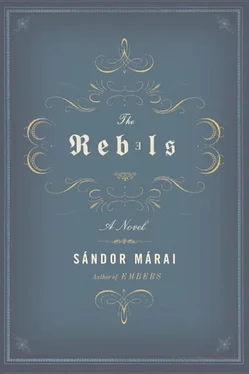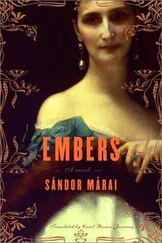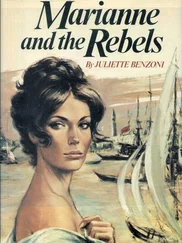He delivered the various articles of clothing in one single lot. The day they first tried them on was March 3, 1918, the day of the Brest-Litovsk Treaty.
THE NICE THING ABOUT FRIENDSHIP IS THAT ITis unselfish. From time to time they took an inventory of their possessions and divided them up among themselves.
Béla offered the double-barreled shotgun and a pair of spurs to Ernõ with a cordial smile. By way of return Ernõ presented him with three raw leather soles from his father’s shop along with a little china Virgin and Child.
Once the habit of exchanging gifts was established it was impossible for the others to refuse. Ábel started by stealing books from home: the second volume of Sons of a Stony-Hearted Man and The Lives of the Saints. The books were dutifully acknowledged. When Tibor stole the colonel’s horn-handled knife, Ábel, in a rush of enthusiasm, offered his aunt’s fortune to the gang. They discussed the offer with a certain reluctance. The word “fortune” awed them: for them it suggested wads of paper money, books full of savings, and any number of precious stones. Eventually they agreed that Ábel should bring them the fortune one afternoon. They put on their specially made costumes for the occasion, and carefully went through the tin box Ábel had delivered precisely on time, rendering an account of all the out-of-date lottery tickets, pawnbrokers’ bills, and worthless old banknotes in a pocket book, before Ábel surreptitiously returned the box to its usual place.
Everyone contributed to the common store according to his talent. The guiding principle was that the worth of any contribution depended on the peril involved in the object’s removal rather than on its fiscal value. It was reckoned a piece of derring-do to extract an officially stamped book from the school library and to sell the volume to that exploiter of poor students, the secondhand book dealer. This was in fact an exploit full of danger because the punishment for taking a valuable institutional book was expulsion, possibly followed by legal proceedings. Ernõ took responsibility for the mission and carried it out with remarkable success. Allegedly he hypnotized the secondhand-book seller into accepting the sale. The money made from such an exchange had to be “used for the good.” As to what that good was, each had his own opinion: with the money they had put together they bought a little gold chain from the local jeweler but, having bargained long and hard with him, left it on the shelf and never returned for it.
The gang made a decision that the various teachers they had tormented over the years, according to the usual unspoken compact whereby staff and students torment each other mercilessly, were off-limits: staff should now be treated with due care and consideration. They sat in class quietly, folding their arms in rapt attention. Béla would rush from the back of the room to the front in order to assist the staff member with impeccable courtesy. Occasionally they combined to astound one or another teacher with their exhaustive knowledge of the set topic and to encourage order and respect among their fellow students. The class regarded all this with suspicion but that didn’t bother them. They were aware that they were partaking of far higher amusements than these other blockheads who hadn’t got beyond age-old idiotic pranks and the crude taunting of teachers: they could be polite, appear to be infinitely conscientious, and could lull and eventually disarm their suspicious, tortured superiors. This was far more amusing than crude, disruptive jokes. Not long before Christmas the form master felt obliged to deliver a short speech to the class presenting Béla and Tibor as exemplars, greeting them like reformed black sheep.
Béla couldn’t control himself. He bought skeleton keys and rubber gloves he had absolutely no use for, for no better reason than that he had unobstructed access to the ready cashbox in his father’s desk. He no longer knew what to do with the money. The gang stuck stubbornly to its “for its own sake” principles, and the ten or twenty crowns they daily procured were spent on equally useless items. Béla developed a double passion for cosmetics and fashionable clothes. After his fervent pleas they allowed him to order two elegant up-to-the-minute suits, along with a silk shirt, a high-quality necktie, fine deerskin gloves, and lacquered shoes with antelope inlay. He also purchased a soft, pale-colored rabbit-fur hat and a light bamboo cane. Once a week he was permitted to dress up in these at Tibor’s apartment, while the gang passed the items to him, the one-armed one being tireless in his efforts to beautify him. Once Béla stood there, fully dressed at the mirror with the hat on his head, the gloves on his hands, and the cane at his side, they made him walk up and down the room like a mannequin at a salon, while they passed critical comments on his outfit. Once this was over he sat in a chair opposite the mirror, grinding his teeth, gazing and gazing at his reflection. Then he slowly undressed. Tibor took the clothes and carefully locked them away in his wardrobe while Béla donned his inelegant school clothes again, the trousers of which were made from an old pair of his father’s.
As far as the cosmetics were concerned, his addiction had to remain a secret from the rest of the gang. His obsession with such items as pomades, scents, face creams, combs, and fine soap did not meet with their approval. He was not allowed to use the expensive lotion he had bought to treat his spots: the gang seized it, made him strip, and spread the cream that, supposedly, could make all spots and warts disappear in a matter of days, over his buttocks.
Their rebellion regarding the function and use of various objects and matters extended to include some peculiar sacrifices. For example it was regarded as correct and admirable to spend days fretting in the attempt to learn some ten lines of text from a Swedish book, a language no one in the region could speak. Ábel won considerable prestige by parroting such phrases. At the same time it was considered a mortal sin to cram for the next day’s Latin or history class. They did not reject intellectual effort in itself but prized it only when it yielded no practical result. There were equally stringent rules regarding sins of the flesh. Tibor was an outstanding athlete, passionate about the long and high jump, so found it hard to resist leaping over a fallen chair or some other obstacle. They let him indulge the joy of leaping, but only when attempting to leap a distance or height that was clearly beyond his capacities and there remained a good chance that he would bruise himself in the process.
The hoard grew and grew. Everything was shoved into Tibor’s room for the time being. It was only the arrival of the bicycle that rendered the space too narrow. The Prockauers lived in a single-story building, and one could only get into the boy’s room by passing through the room where his sick mother lay. The situation was rendered slightly less problematic by the fact that the windows in his room opened onto the yard, so the heavier and more awkward articles could be passed through the window. The window was also useful as a means of entrance and departure though someone usually had to be posted to engage the mother’s attention. The person most frequently entrusted with that task was Ernõ, who would sit with hands clasped by the woman’s bedside, his hat on his knees, his eyes fixed on the ground, while the traffic continued in and out of Tibor’s window.
It was hardly possible to move now in either Tibor’s or Lajos’s room. The purloined objects covered the table, the top of the cupboard, and the beds. The gang had started competing with one another. Ábel had brought his father’s pliers and pincers, an old camera, and parts of his aunt’s girlhood trousseau whose lilac ribbons and yellowed papyrus colors spoke eloquently of the expectations of an unrequired maidenhead. Out of sheer good manners Tibor attempted to match Ábel’s offering with a complete set of his father’s riding gear. Useful household items began migrating from one home to another, swapping places. This was all just a game for now, a test of skill and courage. Tibor would wake some nights with sweat pouring off him to gaze astounded at the crowded room: he dreamt his father had arrived home unexpectedly and ordered him to account for the bicycle, the canvas tailcoat, the medical pliers and pincers. It was Béla alone who, having stolen money, faced a more pressing danger. It wouldn’t have counted for much that he never spent it.
Читать дальше












